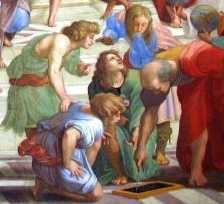Back in June when I translated this one, I said I'd like to know who wrote it. Now I know where to look. The translation is a bit improved now.
We attend to the works of virtue
Ætérne lucis cónditor,
Eternal creator of light
lux ipse totus et dies,
Light itself wholly and the complete day
noctem nec ullam séntiens
nor dost Thou feel any darkness
natúra lucis pérpeti,
given the nature of light eternal
2. Iam cedit pallens próximo
So the night cedes to the nearing pale dawn
diéi nox advéntui,
of the coming day
obtúndens lumen siderum
dimming the light of the stars
adest et clarus lúcifer.
as the gleaming morning star draws near.
3. Iam stratis læti súrgimus
So from our beds rejoicing we arise
grates canéntes et tuas,
and singing Thy glad thanks
quod cæcam noctem vicerit
for the sun has conquered the blind night
revéctans rursus sol diem.
and carried back the day once again.
4. Te nunc, ne carnis gáudia
Now we beg Thee, let no fleshly pleasures
blandis subrépant áestibus,
with alluring passions sneak up on us
dolis ne cedat sáeculi
let our mind not yield to the tricks of the age
mens nostra, sancta quáesumus.
we ask Thee, O Holy One.
5. Ira ne rixas próvocet,
Let anger not provoke violence
gulam ne venter íncitet,
nor the belly incite gluttonous appetite
opum pervértat ne famis,
let neither influence of hunger pervert
turpis ne luxus óccupet,
nor base luxury capture [our minds].
6. Sed firma mente sóbrii,
Rather with constant, sober hearts,
casto manéntes córpore
remaining chaste in body
totum fidéli spíritú
completely faithful in spirit
Christo ducámus hunc diem.
let us regard this day with Christ
7. Præsta, Pater piísime,
Patríque compare Unice,
cum Spíritu Paráclito
regnans per omne sáeculum. Amen.
The author of this 5th or 6th century hymn is unknown. It is recorded in the Rule of St. Aurelio.
WDTPRS – Epiphany Collect: transformed by the beauty of Your sublime glory
-
In the ancient Western Church and in the East, Epiphany was more important
than the relative latecomer Christmas. Epiphany is from the Greek word for
a di...
13 hours ago

1 comment:
Have you thought of continuing this project for the Commons or the Saints? It would be particularly useful for Fr. Lentini's new hymns, most of which have few available translations. For new hymns in the Office of Readings, those who don't speak Latin are particularly in the dark, since the translations aren't available in the Mundelein Psalter.
Thanks!
Post a Comment